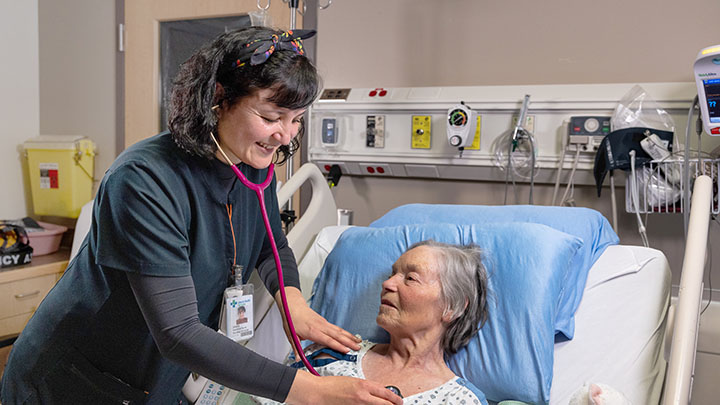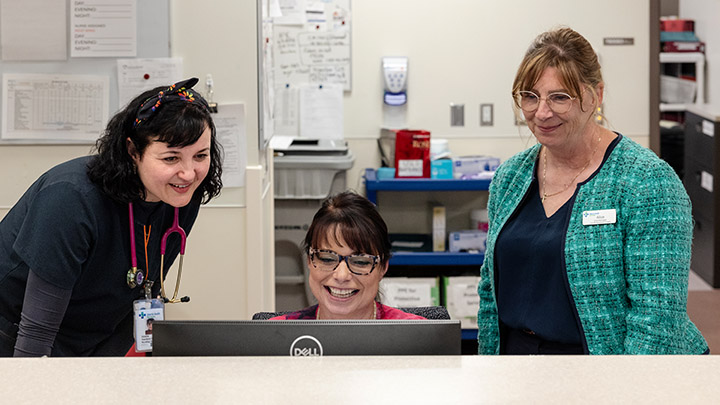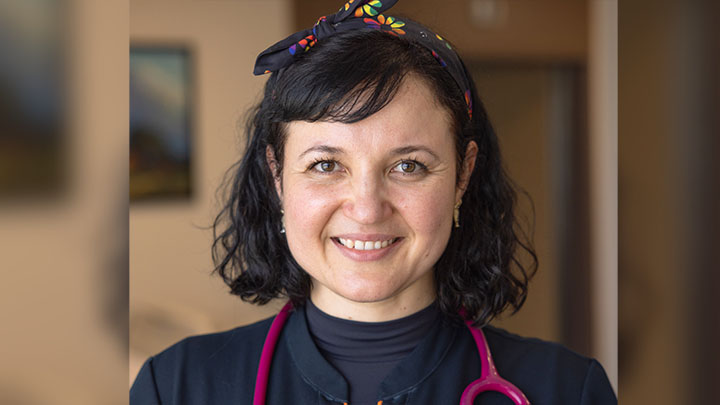
August 7, 2024

Registered Nurse Islaine Dubuc’s commitment to being beside her patients shines through with every interaction. Photo by Nathan Luit.

RN Islaine Dubuc, left, credits her success on Unit 78 at South Health Campus to her team’s kindness and support, particularly her colleagues, RN Daniella Grigelova, and Alice Edwardson, unit manager. Photo by Nathan Luit.

“I feel so happy and proud of myself,” says RN Islaine Dubuc, who’s now six months into her new role. “It was tough to get here, but I would do it all again, just to arrive where I am today.” Photo by Nathan Luit.
Story by Janine Poersch | Photos by Nathan Luit
CALGARY — Islaine Dubuc’s unconditional love of caring for people kept her dream in sharp focus on her journey to practising as a registered nurse (RN) in Alberta.
Dubuc left Brazil for Alberta in 2012, determined to provide a better life for her parents. “They are the most important people in my life,” she says, acknowledging the sacrifices they made to ensure her success. She arrived without a job and only limited English, but firmly committed to building her nursing career. “I was so focused on my nursing. I never stopped thinking about it.”
From housekeeping to childcare, Dubuc took every job — and every opportunity to improve her English over the years. At the same time, she worked toward her RN licensure through the College of Registered Nurses of Alberta which, in 2023, opened a short-term pathway for international nurses with Canadian-equivalent education.
After passing her English exam, Dubuc faced a daunting challenge — the National Council Licensure Examination (NCLEX) for RNs. “I bought books, lessons (and took) classes online.” She passed on her first try, but immediately faced an even higher hurdle — getting a nursing job without any Canadian experience.
Dubuc’s perseverance and compassionate demeanor paid off when she met Alice Edwardson, her manager in Unit 78 Orthopedics at South Health Campus. Edwardson, who loves to nurture nurses, saw something special in Dubuc — and invested the time to see her flourish as a RN.
“I knew immediately that she had the right attitude for nursing,” says Edwardson, who believes some nursing qualities cannot be taught. “(Islaine) loves people, loves caring, and loves to serve.” Edwardson drew up a vision for Dubuc’s orientation.
“I structured it like precepting a student, but with the expectation that she should be able to do more.” Using the colour yellow as a metaphor, she illustrated how nursing practices in different countries may look familiar but can differ in subtle, yet important ways. “What she knew as yellow in Brazil, might be a different shade here.”
While Dubuc brought extensive nursing experience from her native Brazil, Edwardson recognized that Dubuc would learn best through a tailored approach. “I found another senior nurse who had the right personality and experience to really help her. They went slowly, adding more responsibilities and, at the end of it, she was very successful.”
At the provincial level, more support is available for nurses who share Dubuc’s dream.
“The needs of these nurses can vary significantly,” says Fadumo Robinson, associate chief nursing officer. Her team has introduced several provincial resources to help local teams with smoother transitions for domestic internationally educated nurses.
“Some are not newcomers; many have been working here for years as licensed practical nurses or health care aides, while others have been out of practice for some time,” she adds, in describing the unique challenges of each path.
Over the summer, Alberta Health Services (AHS) is sponsoring several newly licensed RNs to participate in a new intensive training program. Offered through a few Alberta post-secondary institutes, the program equips nurses with a certificate and skills checklist that identifies areas for further development.
“A program like this can only benefit,” says Edwardson. “Every unit needs their own specialized approach, but with that assessment, they’ll be many steps ahead.”
Dubuc shares her sentiment, and agrees that this kind of training will open doors for nurses — and help them feel more comfortable in their practice.
For Dubuc, getting used to the technology proved the hardest part. “It’s beautiful here, you have all the monitors, beds that lift patients, (but) it took time to adjust.”
The most critical elements to her success, however, was the kindness and support from her team, including Edwardson. “Everyone was so kind in sharing their knowledge with me. This sharing and the relationships are the most important part.”
“You want to make it a smooth road for them,” says Edwardson. In hindsight, she sees a few fundamentals: Know the nurse’s needs, address them slowly, involve unit leadership and create social connections early.
Today, eager to gain experience, Dubuc picks up extra shifts every chance she gets — a dedicated approach that’s driving her progress, adds Edwardson. “Working more shifts keeps your nursing skills sharp. I think we fulfilled her goal in a successful way, and I can see that she feels good about her career.
“She’s always smiling. The world could be falling down around her, and she’d still have a smile.”
Dubuc gives the credit to her manager: “Alice believed in me. She was so caring and she believed in what I could contribute to the unit.” As a nursing teacher in Brazil, back in the day, Dubuc hopes to exchange her knowledge with others in the future.
“She’s very personable and would love to teach, she’d be great,” says Edwardson notes, who also believes Dubuc will make an excellent mentor for other international nurses who join the unit.
“I went into nursing so I could help people,” says Dubuc, whose mission in life is to care for those struggling with physical and mental health.
“I feel so happy and proud of myself,” adds Dubuc, who’s now six months into her new role. “It was tough to get here, but I would do it all again, just to arrive where I am today.”